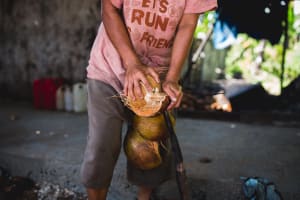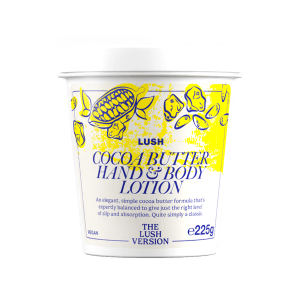At Lush, we pride ourselves on our creativity, and this doesn’t stop with our products. Since we began, our aim has been to use the best, safest and most beautiful ingredients in our formulas and as mindful materials as possible to package and display them. In our long history, starting before Lush existed, we have discovered that if you want the best ingredients, you have to go out into the wider world and find them yourself. Our dedicated global Creative Buying team works tirelessly to ensure that’s what we get. Often this involves a great deal of creative thinking (hence, creative buyers) to find solutions to problems while working towards our vision that each and every ingredient we purchase contributes towards Leaving the World Lusher Than We Found it. In fact we have ceased to aim for just sustainable, and wish to reach beyond that to be regenerative — making sure that our purchases put back more into the soil, into the community and into the natural world than they take out, at the same time providing profit and a viable business for all of us.
We have a very strong commitment to the communities and areas from which we buy our ingredients and materials. We believe that our ingredients should be bought in a respectful way, safeguarding the environment and with consideration for their associated social impact. We work with many different types of suppliers of various sizes and structures and work with different certifications such as fair trade and organic, as well as non certified community initiatives. We find out what impact our buying has on people and the environment to make responsible decisions regarding from where, from whom and how we purchase ingredients and packaging for Lush. We ensure that our selection process is holistic, and have different policies, stances, platforms and partners in place who help guide our buying practices, help increase transparency and work towards fair dealings for all parties involved.

The Lush Buying Policy
In 2018, we introduced our People Care, Earth Care and Fair Share Buying Policy into our buying practices. All suppliers that we buy from are required to sign this policy before we start purchasing from them, and are required to resign whenever we review or make amendments to the policy. It was introduced in addition to our already existing Non-Animal Testing Policy (which you can read more about in the Animal Testing principle), and aims to guide our supplier’s buying practices to ensure they align with Lush’s company values and underpin our commitment to doing business in the most ethical way that we can.
We recognise that being a global business affords us a certain level of power, therefore we strive to use our economic activity in the most impactful way possible; improving practices where needed and leading by example. We collaborate with producers and other experts in the supply chain to prioritise the welfare of both humans and animals and to help lessen the environmental footprint we leave behind. Our aim is for everyone in our supply chain (all direct and indirect suppliers of raw materials and packaging products and their subcontractors) to share and adhere to these policies.
Our buying policy is split into three pillars: People Care, Earth Care and Fair Share, which are inspired by principles of permaculture. Each section is made up of non-negotiable and progressive standards, with varying obligations required from our suppliers. Our non-negotiable standards are legal obligations and/or standards that we consider are a minimum that everyone needs to adhere to. These include, but are not limited to, things such as no forced or child labour, safe working conditions, no use of GMO’s and protecting animal welfare. Our progressive standards are more aspirational. We appreciate that not all suppliers will be able to reach these just yet, but want to encourage and support them in their journey to achieving these. The progressive standards mainly sit in the Earth Care pillar and include things like soil health management, use of highly hazardous pesticides and forestry management.
As is the case with all our policies, we prefer to work with our suppliers to help them move towards compliance. We always listen to our suppliers, understand their barriers and collaborate on setting benchmarks and mutually acceptable solutions in an agreed timeframe to support a change that works both for our standards and for our suppliers business. If a supplier is non-compliant with our Buying or Non-Animal Testing Policy, and we cannot reach an agreement on how to remediate the issue and move forward, resourcing an ingredient may be required as a last resort. We believe that we have the most influence over suppliers that we currently work with and that it becomes nearly impossible to help improve a supply network that we are not involved in. Where re-sourcing is deemed necessary and of course, new materials are sought after for our inventors, newer relationships are anchored in open dialogue, demonstrable efforts towards producing materials the right way and a commitment to improvement in all aspects of business dealings.
Supplier Improvements and Remediation
When we say we want to collaborate with suppliers on their social, environmental and animal testing impact, we really mean it. Our buying team, and the wider business, have multiple resources to help suppliers with any barriers they may be facing, or improvements they are passionate about. Our relationships are always mutually beneficial and we know that there is so much to learn from communities who have made these ingredients their livelihoods. Maintaining trust and open, bilateral communication allows us to provide support where needed, and we receive the benefit from our suppliers teaching us their expertise about their passions.
One source of support we offer our suppliers is through the Improvements & Remediation Fund. This is a discretionary fund, dedicated to supporting engaged suppliers in projects that improve their social or environmental impact, or further our mission to fight animal testing. Suppliers who have shown an interest in making improvements to social and environmental standards, or are otherwise heavily engaged with Lush’s values are invited by our creative buying team to apply for funding on projects that meet our criteria.
In FY2024, we carried out 13 projects in which we contributed about £166,000. This was alongside the human rights assessments we commissioned for three separate suppliers in the same period.
In FY2024, our Lush Indonesia Hub worked in collaboration with Oho Niha Oil to implement an Internal Control Systems based Organic Coconut Plantation Practice on Nias Island, Sumatra, Indonesia. This collaboration involved 100 local coconut farmers who supply coconuts to Ono Niha for virgin coconut oil production, which is then bought by Lush to use in some of our products. It was noted by the farmers that they are facing declining coconut yields, and that due to an aging tree population, it was only going to get worse. The project aimed to raise local awareness on sustainable coconut farming practices, and prepare them for the future.
The project included training so that farmers could establish a nursery, have their own internal control system, understand organic fertilisation methods and produce this themselves. It also helped them prepare and plant coconut seedlings, and to understand supply chain traceability requirements for mapping their coconut plantations. We also provided technical support and helped establish a demonstration plot for the implementation of an intercropping system which has organically reduced the spread of pests and diseases and improved soil fertility and structure.

Almost 100% of the coconut farmers under this programme have stopped using herbicides and chemical fertilisers and the majority of the farmers have been producing their own organic composts. We have had 38 farmers replicate this intercropping system on their own land so far.
Lush Stance on Fair Trade
At the time Lush was founded, the majority of consumers were not fully aware of where the food that they ate or goods that they used came from. However, over time, there were concerns raised around the poor working conditions for producers of goods that came from afar. As a result of these concerns, various groups came together across the world to form direct relationships with producers of bulk commodity materials, such as coffee, tea, sugar and cocoa, and in 1997 the Fairtrade Labelling Organisation (FLO) was established.
Despite Fairtrade certification and other certification schemes being a useful tool, and a reassuring mark of producers and traders doing the right thing, Lush as a company does not solely rely on these certifications. We find that working as directly as possible with primary producers of our ingredients and packaging is the best way for us to achieve transparency in our supply chain, while also making sure that our supplier relationships are fair and built on open communication.
External certification needs to be the right choice for the producer and as part of our trusting relationships we will not force suppliers who are doing the right thing to become certified. The term fair trade, whilst associated with formal certifications, can be expressed and verified in many forms, some of which are far more economically viable for our producers. For example, we work in collaboration with suppliers who choose to demonstrate fair trade practices in alternative ways that don’t align with the certification standards currently available. This includes projects such as a Participatory Guarantee System, or verifying the price paid directly to farmers ourselves.
There are only two materials where we have mandatory requirements for certification – cocoa and cotton. These two supply chains are particularly high risk and we feel that certification provides a valuable additional layer of verification of practices. For other materials, we welcome certification where it is readily available, however, we prioritise building collaborative and trusting relationships that offer traceability and transparency on working conditions, growing practices, environmental and cultural impact.

Currently, we receive 173 materials from 101 suppliers into our UK Manufacturing site that are either organic or fair trade certified or both. Across these suppliers, 34 different organic certification schemes are used, as well as 7 different fair trade certification schemes. This information is most reliable for the UK, as globally we track this data in different ways, however we are in the process of aligning this so we can better report on our organic and fair trade certifications globally.
As a company we also partake in our own facility certification. Our UK, Croatian and Australian manufacturing sites are FLOCERT Fairtrade certified, which allows us to trade FLOCERT Fairtrade certified materials such as Cocoa Butter, Almond Oil, Agave Syrup and Honey, among others.
Creative Buying
It is fair to say that at Lush we approach buying differently compared to the majority of other brands. It takes a certain amount of creative thinking and ethical consideration, especially when you hold things such as transparency and good supplier relations in as high esteem as we do. As with a lot of global businesses, our supply networks are complex and involve a number of different processes. While trying to source as directly as possible to un-complicate things, it is not always an option, and a lot of our networks are made up of several tiers stretching over numerous countries. We source our materials from close to 1000 suppliers (raw materials and packaging) and from about 97 countries globally, with a combined global buying spend of £81.6 million. We learnt early on in our journey that it is vital to gain an understanding of each material, from who is involved in its supply to the local impacts of its production, in order to ensure top quality ingredients with no exploitation at any stage. To help map out our supply networks, we utilise a platform called Authenticate. This software helps us to map our direct and indirect suppliers all the way back to source while identifying social and environmental risks based on material category, extraction processes, country, site locations and more.
Our preference is always to see, for ourselves, how our suppliers work. Our buyers and buying support teams conduct regular in person visits with our top priority suppliers so we can do just that. In FY2024, we conducted our yearly salient human rights risk assessment of all our ingredients and packaging suppliers (which we have mentioned in the Commitment to Transparency and External Audits principle) and so we know that the biggest risks in our supply network come from mined materials and fragrance materials with an agricultural source. Therefore, we will prioritise visiting and understanding these networks to help mitigate the human rights risks that have been identified. Since July 2023, we have visited 47 suppliers and you can read about our findings and the action we have taken in our 2023/2024 Modern Slavery Statement. We nurture long term relationships with suppliers that we dynamically evolve with, working together to positively impact individuals directly involved in our supply network. These partnerships allow us to source the best quality materials that can be used to manufacture beautiful products that our customers love.
Our combined global buying spend in 2024, from 1000 suppliers in 97 countries
fair trade or organic materials in our UK manufacturing site
Whistleblowing
At Lush, we want to make sure that, as much as possible, fair trade, transparency and respect is continuous throughout our entire supply network and to ensure that anybody involved is able to speak up and be heard when malpractice is at play. This is why our Whistleblowing Policy is not just available for all employees of Lush around the world in every location, every contract type, role, position or employment length, but applies equally to anyone who has had any type of business relationship with Lush such as agency workers, volunteers, business partners, contractors, suppliers and their employees. The purpose of our whistleblowing policy is to provide a mechanism for reporting, investigating and remedying instances of malpractice in the workplace which applies to our business and those in our supply chains. Anyone in our supply network can raise concerns at any time about an incident that happened in the past, is happening now, or is believed will happen in the future.
Whistleblowing is the name given to the act of reporting malpractice, which covers things such as criminal activity, breach of legal obligations, environmental damage, acts of bribery, tax evasion, unlawful cash procedures, theft of company money or property, modern slavery, risk to health and safety, endangering staff or members of the public or any attempt by anyone to conceal these things. Malpractice at Lush also includes any activity which would result in non-compliance with our legal and ethical policies including the Ethical Buying Policy, Non-animal testing policy and anti-bribery policy, for example. As a company, we are committed to providing a safe place for our staff and everyone associated with Lush to speak up. We will ensure the protection of all whistleblowers who raise genuine concerns about any instances of malpractice, even if such concerns result in no findings of malpractice. Whistleblowers must not suffer any detrimental treatment as a result of raising a concern, which includes dismissal, disciplinary action, threats or other unfavourable treatment connected with raising a concern.
Further reading →
12:11




